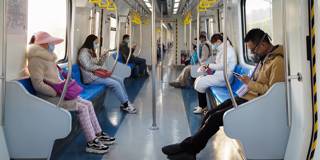Efforts to turn an effective institutional response to the pandemic into a political or ideological battleground are misguided, at best. As the late Nobel laureate Ronald H. Coase showed, regardless of ideology or politics, each society must develop institutional arrangements that constrain individual freedom.
HONG KONG – In 1960, the Nobel laureate economist Ronald H. Coase introduced the “problem of social cost”: human activities often have negative externalities, so individual rights cannot be absolute. Institutions must intervene. There is no better example of this dynamic than the COVID-19 crisis.
While virtually every country has suffered as a result of the pandemic, some have done much better than others. Whereas some have reduced COVID-19 cases to near zero, others have had steadily climbing infection and death rates for months. As McKinsey & Company has noted, economic activity associated with discretionary mobility has returned to normal for the former group. Among the latter, such activity remains about 40% below the pre-pandemic level.
Not everyone is suffering equally. Low-paid workers with inferior access to medical care and less opportunity to stay home – say, because their jobs are classified as “essential” – are bearing the clinical and economic brunt of the crisis.

HONG KONG – In 1960, the Nobel laureate economist Ronald H. Coase introduced the “problem of social cost”: human activities often have negative externalities, so individual rights cannot be absolute. Institutions must intervene. There is no better example of this dynamic than the COVID-19 crisis.
While virtually every country has suffered as a result of the pandemic, some have done much better than others. Whereas some have reduced COVID-19 cases to near zero, others have had steadily climbing infection and death rates for months. As McKinsey & Company has noted, economic activity associated with discretionary mobility has returned to normal for the former group. Among the latter, such activity remains about 40% below the pre-pandemic level.
Not everyone is suffering equally. Low-paid workers with inferior access to medical care and less opportunity to stay home – say, because their jobs are classified as “essential” – are bearing the clinical and economic brunt of the crisis.